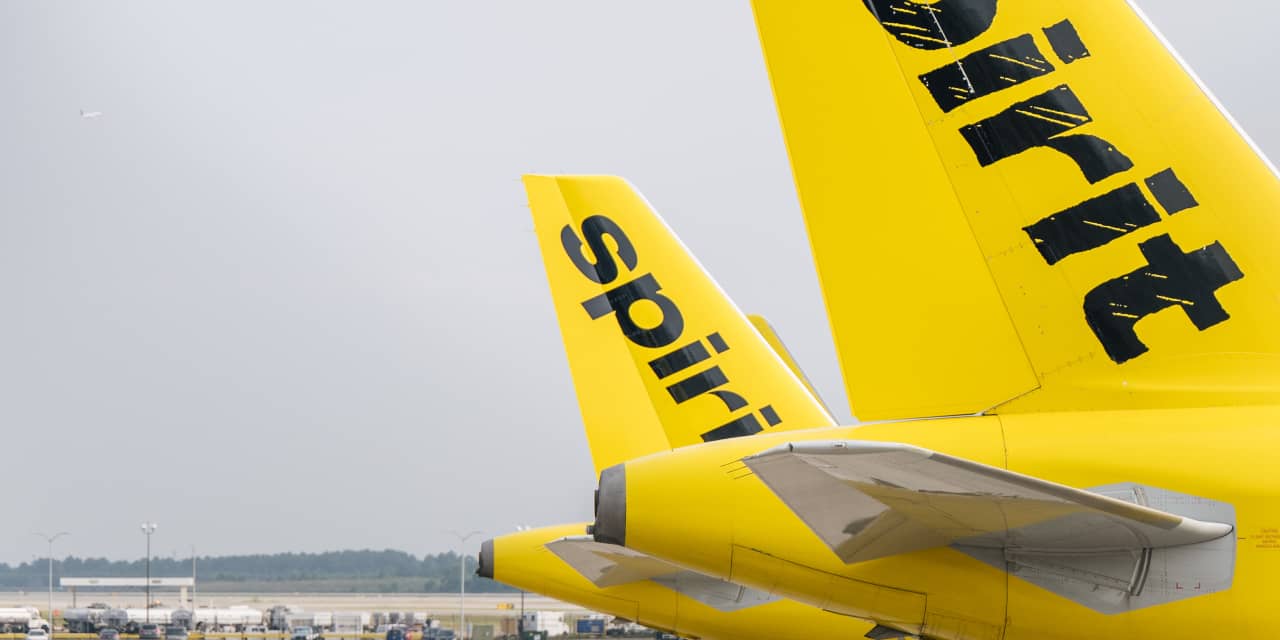Spirit Airlines
posted a narrower-than-expected fourth-quarter loss Thursday, and CEO Ted Christie struck an optimistic tone about the company’s fortunes in 2024.
The stock, though was lower despite the good news.
Shares of Spirit were down 0.5% shortly after the market open Thursday. The stock has fallen 58% so far in 2024 as of Wednesday’s close.
Spirit needed to show a clear path, or at least a plan, to return to profitability as a stand-alone company—after its proposed merger with
JetBlue Airways
was blocked by a federal judge last month.
It didn’t quite deliver on that, despite beating expectations and signaling a domestic rebound in 2024.
Spirit reported an adjusted loss of $1.36 a share on revenue of $1.32 billion in the fourth quarter. Wall Street was expecting a loss of $1.42 a share on revenue of $1.32 billion.
Christie said current booking trends furthered the company’s confidence that “the domestic environment is beginning to rebound.”
He estimated an “unprecedented” sequential improvement in total revenue per available seat mile, or unit revenue, in the first quarter of 2024. He added that the team was focused driving the company back to cash flow generation and profitability.
The ultra-low-cost carrier has had what can best be described as a turbulent start to the year.
There are two obvious ways out of the slump: One is that an appeals court overturns the ruling ahead of the JetBlue merger agreement’s July 24 deadline, which isn’t likely, but not out of the question. Spirit said Thursday it remains focused on “consummating the merger.”
The other is for Spirit to demonstrate a path back to profitability. The adjusted loss in the final three months of 2023 is the airline’s second consecutive quarterly loss.
Analysts are expecting the airline to post an adjusted loss for the next eight consecutive quarters, according to FactSet data.
Spirit’s guidance suggests that revenue will come in better than expectations in the first quarter—between $1.25 and $1.28 billion, compared with the Wall Street consensus of $1.24 billion.
A surprise profit looks unlikely though, as analysts forecast a loss of $1.57 per share, wider than in the fourth quarter.
Credit-ratings firm Fitch downgraded Spirit’s debt to B- from B last month and warned the company must improve profitability to avoid another rating downgrade.
The airline’s Chief Financial Officer Scott Haralson said the company’s $1.3 billion in total liquidity at the end of 2023 “should be more than adequate to get us to our primary goal of getting the business to generate cash,” in a statement Thursday.
“This is a milestone we think we will cross as we enter March,” he said, adding that he expects Spirit to be cash flow positive in the second quarter and beyond.
There are more green shoots for Spirit, and the wider low-cost airline industry—and not just from Christie’s assertion that domestic demand is starting to rebound.
On Tuesday,
Frontier Group’s
earnings lifted the broader sector and could point toward positive momentum for Spirit.
Frontier broke even, compared with expectations of a 23 cents per-share loss. President Jimmy Dempsey said revenue trends have improved beyond expectations so far in 2024, and that he expects continued improvement throughout the year.
Frontier stock jumped 21% Tuesday, but Spirit also got a boost, rising 13%.
That jump may have watered down the reaction to Spirit’s earnings beat Thursday. Given the airline’s predicament, investors needed to see more.
Write to Callum Keown at [email protected]
Read the full article here




